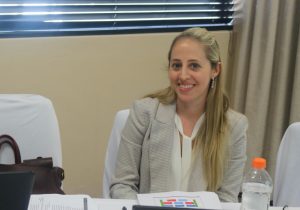Daniela Bove is working in Advocacy Analyst and Public Affairs Division at the Competition Commission of South Africa who completed her legal studies from Wits University and further, pursued a master in competition and economics from University of London. After working in the corporate field for some time, she shifted towards the policy sphere. In this interview, we intend to look into the dynamics of the work in a setting such as the Competition Commission. We thank Ms. Daniela Bove for giving her time for this.
- You did your Bachelor studies from Wits University and then pursued your Masters from the University of London. Why did you choose to study at the University of London?
International markets have become increasingly integrated with the emergence of cross-border mergers and acquisitions and digital economies. I wanted to learn more about competition regulation in a global context and achieve an international qualification. At the time of my studies, there was no equivalent master’s degree offered in South Africa and so, I planned to pursue my studies from the University of London.
- As a follow up to the question above, apart from the academic activities, which extra curriculum activities did you partake in while at law school?
I say that always make time for your interests. So, apart from my academic activities, I was engaged in Pilates and Latin American and ballroom dancing.
- How did you decide to specialise in competition law, and particularly what were the reasons behind opting for the advocacy division? Further, how has your work transformed into the one in the current division?
I was an Attorney in practice and worked in the corporate environment before joining the Commission. I wanted more of a challenge and to do work that betters the lives of others. I worked in the Mergers Division and then joined the Advocacy team to focus on policy issues.I was persistent with applying for roles at the Commission. So, I completed a postgraduate diploma with Kings College in competition economics to prepare me for entry into the profession. Working in the field of competition regulation has exceeded my expectations. I have enjoyed the exposure to working with lawyers, economists and policy makers. It is a rewarding job because competition regulation evolves and enhances the scope for applying different facets of the law. It is impactful work that is meaningful to consumers. And most definitely, I have achieved something that provides me content, i.e., the work has made an impact.
- What has been the biggest challenge in the workplace, and could you share what you would term as your biggest achievement at the Competition Commission?
The workload is challenging at times but that is the nature of the field.For the second part of the question, I would say that the approval by the Competition Tribunal of a prohibited transaction I investigated with a team from the Commission and pro-competitive changes made to economic policy following engagements with government departments was one of the biggest achievements.
- Would you say the Competition Commission is doing enough to fulfill what it seeks to fulfill?
That is an important question. The Commission is actively enforcing its mandate and has demonstrated its success through all its case and advocacy work in the last 20 years. The South African markets are highly concentrated and there are systemic societal issues to be tackled. There is definitely more work that has to be done.
- What advice would you give to someone who wishes and intends to work at the Competition Commission?
I would suggest that you complete a competition law module or diploma course to demonstrate your interest in the field, participate in the Commission’s webinars to get an understanding of the economic theory and legal framework and calls to present papers at conferences. Monitor the Commission’s website for recruitment opportunities and get in touch with its human resources department to make enquiries. But most importantly, get involved and make connections with people in the field.
The interview was taken by Kanyiso Kezile(student at University of Fort Hare, South Africa) as part of the UPeksha Mentorship Programme in collaboration with EBC-SCC Online.

